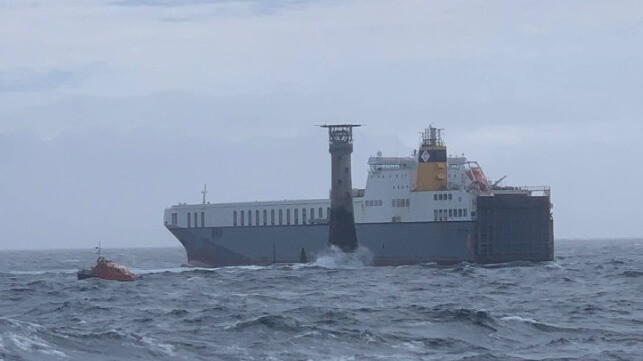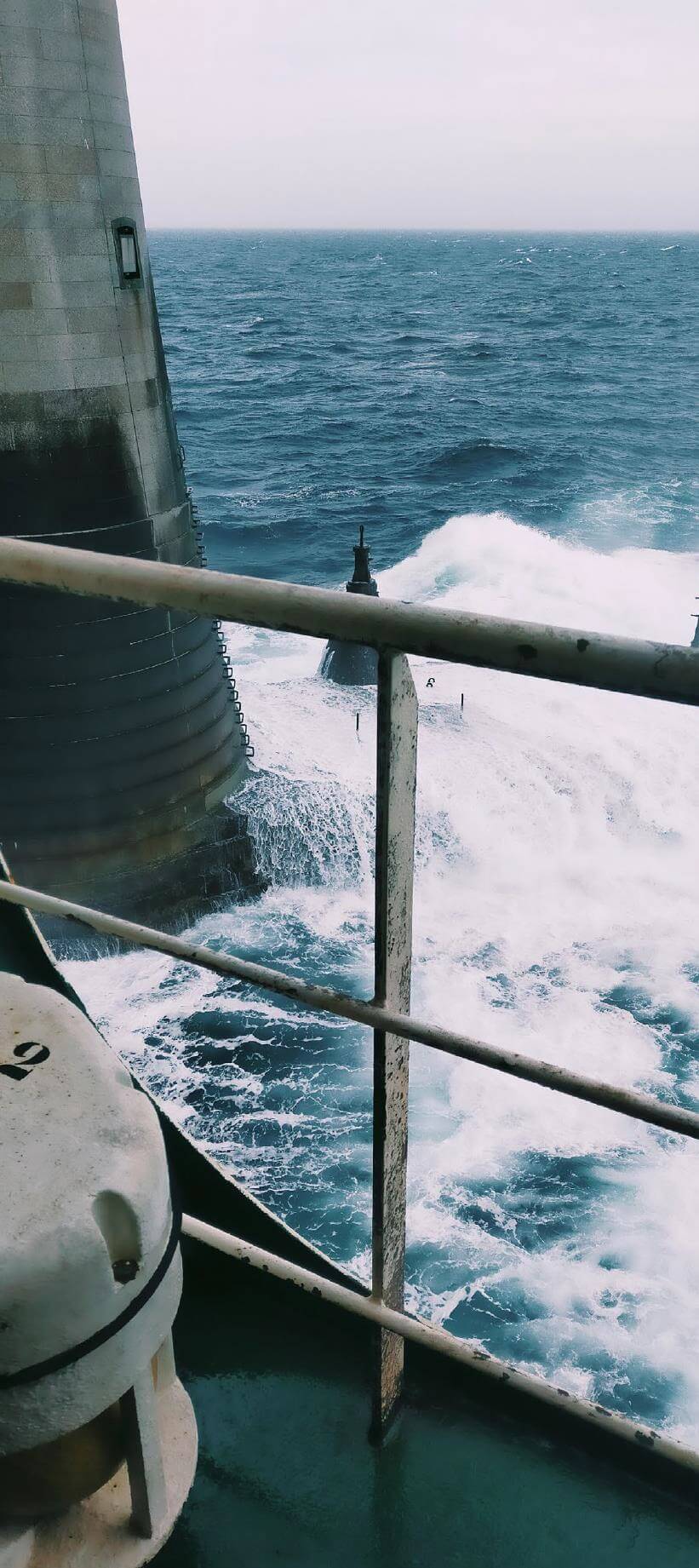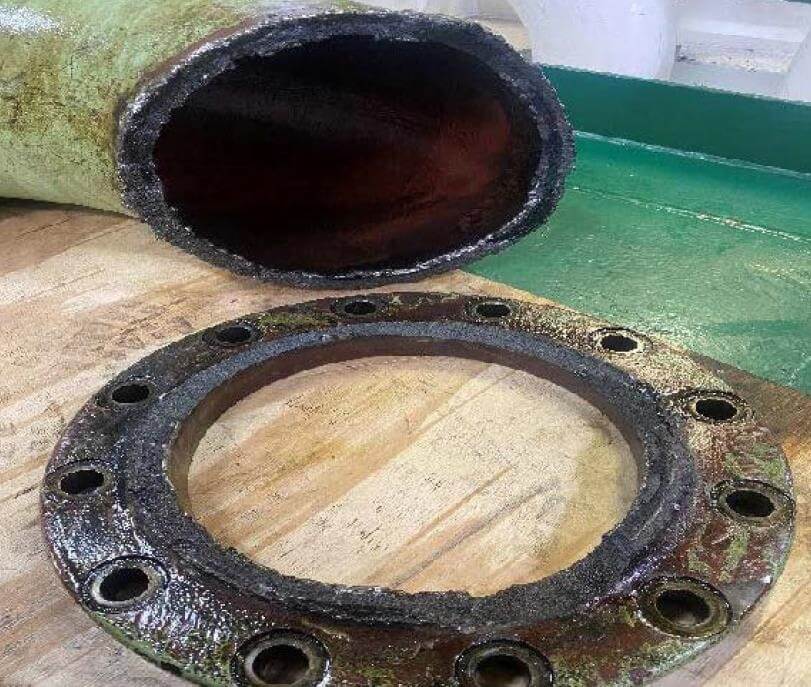To Prevent a Serious Grounding, Ro/Ro's Engineers Tried "Impossible" Fix

The engineering crew aboard the ro/ro freight ferry Mazarine made a heroic attempt to restore power after a large pipe fitting in the main engine lube oil system cracked, according to Transport Malta - but their efforts were ultimately unsuccessful, resulting in a grounding and extensive damage to the hull.
Mazarine is a 200-meter cargo ro/ro flagged in Malta. On July 10, 2023, she was under way on a routine run from Cork, Ireland to Zeebrugge, Belgium, via the English Channel. At about 0830, she was heading south in the traffic separation scheme off Land's End, UK, near Wolf Rock. She had 71 trucks and trailers on board, along with three passengers. The third mate had the watch, and was accompanied on the bridge by the chief officer and the "safety master" (an extra master mariner along for training).
At about 0905, the chief engineer and second engineer were working on the lube oil filters for the main engine when they heard a loud crack. They looked around and saw lube oil spraying out of a pipe elbow on the main lube oil pump. At about the same time, the engine shut down automatically due to loss of oil pressure.
Mazarine quickly began to slow, and the vessel's master - who was in his cabin - ran to the bridge to find out what was happening. He noticed that the engine had stopped and that Mazarine was drifting towards Wolf Rock, which was about four nautical miles away.
The master called the chief engineer, who told him that there was a crack in the cast-iron elbow fitting that connected the lube oil pump's discharge side to the rest of the lube oil piping. The elbow was a special OEM part, and there was no spare aboard.
The chief engineer estimated that it would take several hours to jury-rig a repair that would plug the crack well enough to restart the engine. However, the master told him that he might have an hour before Mazarine drifted onto Wolf Rock, and encouraged him to try to do what he could in that timeframe. The chief engineer said that he would try, but he warned that such a quick fix might not work.
At about 0950, the repairs were half done, and the vessel was just 1.5 nautical miles off Wolf Rock. The master advised the Falmouth Coastguard station that it was unlikely that the ship would be able to restart the engine, and he was going to drop one anchor. The water depth was 70 meters, and he knew that under the circumstances it would not likely hold, but he had the crew pay out eight shots (gradually, under power).
At 1010, Wolf Rock was just 0.7 nautical miles away, and the anchor was down - but Mazarine was still drifting. The repair work was still in progress: the engineers had pulled the two sections of pipe back together with chain pullers, and patched up the crack with epoxy, fiber bandage, rubber mat and metal clamps - but the C/E assessed that there was little chance it would hold if it were repressurized right away. Nonetheless, the safety master urged him to turn on the lube oil pump and see if it might work, even if the odds of success were slim. (Just in case, the master ordered the crew and passengers to muster and put their lifejackets on.)
At 1023, the chief engineer turned on the standby lube oil pump. It began to build pressure, and the pipe repair immediately failed - and this time, the crack widened all the way around the pipe's circumference at the flange.
Five minutes later, the vessel drifted onto Wolf Rock. For the next half hour, Mazarine's hull pivoted against the rocky pinnacle, grinding against the surface. The master advised Falmouth Coastguard that he did not wish to order abandon-ship, as the crew and passengers were still safe and the vessel's stability was not compromised. At 1058, the wind and waves swung Mazarine's hull free of the rocks, and the vessel drifted away into open water.

Courtesy Transport Malta
As the crew checked for damage, they noticed rising liquid levels in multiple tanks aft - two ballast tanks, three oil tanks and a void space under the engine room. Luckily there was no flooding in the engine room itself, and the engineers did what they could to prevent it, plugging drains and tank openings.
The elbow fitting was stills broken, and this time the damage was more extensive than before. The chief engineer and the master consulted again, and they decided that the best course of action was to remove the fitting and attempt to make a weld repair on the cast iron part. Cast iron is notoriously challenging to weld, requiring specific welding electrodes - which the ship luckily had aboard - along with careful technique to avoid cracking.

Courtesy Transport Malta
The crew removed the heavy part with a hoist and chain, and they brought it to the workroom to clean it and weld it. The fitter used the correct welding rod, and he allowed the part to cool for half an hour after he finished the bead. At 1246, after putting the elbow back in and tightening on the fitting, the engineers restarted the lube oil pump - and again it cracked, this time at half of normal operating pressure.
Mazarine continued to drift in open water, and was not in any further danger. At about 1530 hours, a tug arrived to take the vessel in tow to Falmouth, where the ship underwent a dive survey and was drydocked for repairs. The hull required extensive repairs on the port side aft in order to close up multiple hull perforations and replace deformed plating.

that matters most
Get the latest maritime news delivered to your inbox daily.
After the casualty, the broken pipe elbow was taken to a metallurgical lab for examination. The casting material appeared to be of high quality, and there was no clear cause for the crack; because of the attempted weld repair, it was difficult to analyze the actual location of the break. The OEM had no record of a previous failure for this component.
Transport Malta's investigators commended the Mazarine's bridge crew for taking timely and appropriate action in response to the loss of power, and found no fault with their response. The agency also noted the exceptionally challenging circumstances of the repair work under time pressure, and did not fault the engineering crew. "The on-board repair of a crack of this nature on a critical piece of equipment, was extremely difficult, if not impossible," Transport Malta concluded.
